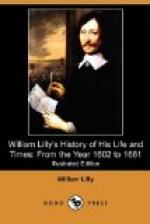Thirdly, I found it best as unto point of time, because many of the soldiers were wholly for it, and many of the Independant party; and I had abundance of worthy men in the House of Commons, my assured friends, no lovers of Presbytery, which then were in great esteem, and able to protect the art; for should the Presbyterian party have prevailed, as they thought of nothing less than to be Lords of all, I knew well they would have silenced my pen annually, and committed the Introduction unto everlasting silence.
Fourthly, I had something of conscience touched my spirit, and much elevated my conceptions, believing God had not bestowed those abilities upon me, to bury them under a bushel; for though my education was very mean, yet, by my continual industry, and God’s great mercy, I found myself capable to go forward with the work, and to commit the issue thereof unto Divine Providence.
I had a hard task in hand to begin the first part hereof, and much labour I underwent to methodize it as it is.
I ingenuously confess unto you (Arts’ great Mecaenas, noble Esquire Ashmole,) no mortal man had any share in the composition or ordering of the first part thereof, but my only self. You are a person of great reading, yet I well know you never found the least trace thereof in any author yet extant.
In composing, contriving, ordering, and framing thereof (viz. the first part) a great part of that year was spent. I again perused all, or most, authors I had, sometimes adding, at other times diminishing, until at last I thought it worthy of the press. When I came to frame the second part thereof, having formerly collected out of many manuscripts, and exchanged rules with the most able professors I had acquaintance with, in transcribing those papers for impression, I found, upon a strict inquisition, those rules were, for the most part, defective; so that once more I had now a difficult labour to correct their deficiency, to new rectify them according to art; and lastly, considering the multiplicity of daily questions propounded unto me, it was as hard a labour as might be to transcribe the papers themselves with my own hand. The desire I had to benefit posterity and my country, at last overcame all difficulties; so that what I could not do in one year, I perfected early the next year, 1647; and then in that year, viz. 1647, I finished the third book of[14] nativities,[15] during the composing whereof, for seven whole weeks, I was shut up of the plague, burying in that time two maid-servants thereof; yet towards November that year, the Introduction, called by the name of Christian Astrology, was made publick. There being, in those times, some smart difference between the army and the Parliament, the head-quarters of the army were at Windsor, whither I was carried with a coach and four horses, and John Booker with me. We were welcome thither, and feasted in a garden where General Fairfax lodged. We were brought to the General, who bid us kindly welcome to Windsor; and, in effect, said thus much:




